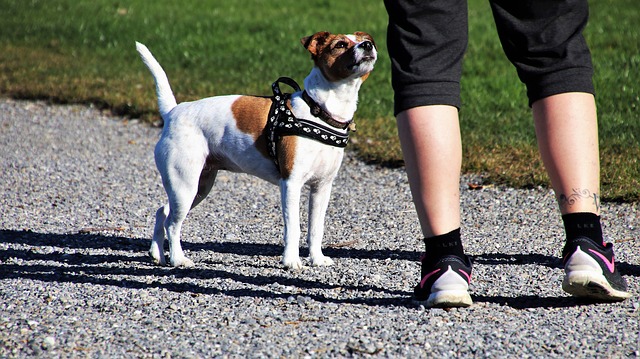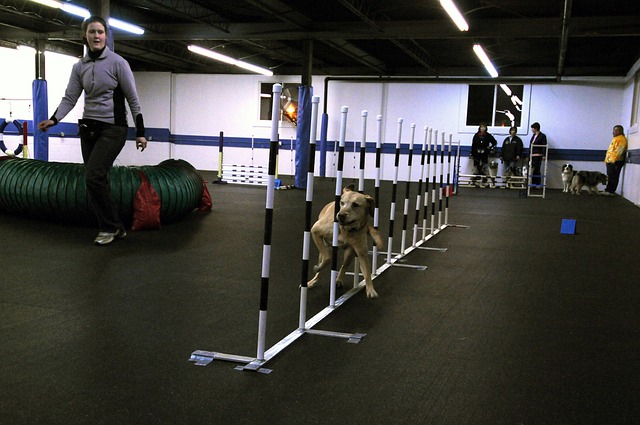The career of a dog trainer combines practical teaching skills with knowledge of animal behavior.
Consistency, patience, and great verbal and non-verbal communication skills help a trainer teach both canine and human clients efficiently.
Mostly, dog trainers are self-employed.
However, some may work as a part of a pet store’s obedience training program or for a head trainer.
Trainers may also work for animal shelters, boarding kennels, or vet clinics.
They may offer private or group lessons as well as home visits.
They can specialize in behavioral modification, obedience, therapy or service dogs training, aggression management, show dog handling, agility, trick training, puppy training, and more.
Trainers can also specialize in specific breeds.
Article Table of Contents
Dog Trainer Duties & Responsibilities
Generally, dog trainers should be skilled to do the following:
- Hand signals.
- Operant conditioning.
- Reward systems.
- Positive reinforcement.
- Voice commands.
- Clicker training.
Dog trainers use these techniques to teach improved or new behavior.
They examine the progress of a dog and educate owners about the best ways to reinforce these methods at home.
They can also provide the owners with additional exercises to be done away from the dog training lessons.
They have to be sensitive to the owners’ needs and able to make them see how important their role is in the ongoing training of their pets.
Dog Trainer Salary
The salary for dog trainers may vary, depending on their area of expertise, education, certifications, and experience.
- Median Annual Salary – $34,760 ($16.71/hour).
- Bottom 10% Annual Salary – Less than $19,610 ($9.43/hour).
- Top 10% Annual Salary – More than $56,000 ($26.92/hour).
Dog trainers may also face additional costs for their business, such as travel, insurance, training facility fees if any, advertising.
Education, Training, & Certification
Dog trainers aren’t required to have any formal training or licensing, but most of them receive some type of education and certification.
Some trainers can learn in an apprenticeship with an experienced dog trainer.
There are other options, many of which include certification and in-depth training.
- Training School:
A good training school teaches dog training, learning techniques, behavior evolution as well as how to design your classes for clients.
The coursework consists of lectures, readings, and practical training.
Students can also benefit from experience working with various breeds in animal shelters or vet clinics, or college work in animal behavior. - Certifications from CCPDT:
The Certification Council for Professional Dog Trainers (CCPDT) has been around since 2001.
It offers two types of certification.
The first one is knowledge-based (KA), and it requires a minimum of 300 hours of dog training within three years.
You will also need a signed attestation from another CCPDT certificate holder or vet.
The second certification is skill-based (KSA).
Applicants need to have the CCPDT-KA credentials.
This certification also requires credits from continuing education to maintain the certification. - Membership with APDT:
The Association of Pet Dog Trainers (APDT) exists since 1993.
It has a “Professional Member” classification offered to those who have the CCPDT certification of some other animal behavior societies, additionally to associate and full memberships.
Currently, there are more than 5,000 members, which makes it the largest dog trainer association.
Note that almost 3,000 candidates took the certification knowledge test with a pass rate of 85%.
In March 2017, there were 3,088 CCPDT-KAs and 173 CCPDT-KSAs worldwide.
Dog Trainer Skills & Competencies
Not everyone can be a dog trainer.
There are some qualities and traits you need to succeed in the field:
- Patience – Dogs have different behavioral traits, so it’s essential to be patient and not get frustrates.
They can pick up your attitude, even if it’s not clearly visible. - Confidence – With more confidence, dogs will respond to you better.
Clients can also notice that and refer other people to you.
While you shouldn’t brag with your skills, marketing what you have is still necessary.
If you are confident in what you can offer, new and prospective clients will know that you can get the job done. - Not a neat freak – This may seem strange, but if you worked with dogs, you know that this business is messy.
Sometimes you may have to roll in the mud, deal with drool, wet and dirty paws, and get your clothes dirty. - Communication skills – This is mandatory because if you can’t communicate with owners and animals, you won’t succeed in this career.
- Passion – This is another obvious thing.
If you don’t have a passion for dogs, this career may not be for you.
Job Outlook
According to the National Pet Owners Survey, 68% of families in America had pets in 2017.
Out of those, about 60 million had dogs.
This number is rising.
Keeping this in mind, the job outlook is projected to grow.
The highest job growth will take place in major metropolitan areas in such states as New York or California with the largest numbers of dog owners and dogs.
Work Environment
Dog trainers may work together with other dog trainers or independently.
They may work at their clients’ homes, clinics, or dog daycare centers.
Work Schedule
The hours of dog trainers are flexible to suit the client’s needs.
So they may work on weekends or nights.
If the job is based in a dog daycare center, the hours are regular.
How to Get the Job
Apply
Look for the latest job postings at such resources as Monster, Glassdoor, or Indeed.
Find a Volunteer Opportunity
Find a local animal shelter and see if they need another volunteer.
Find an Apprenticeship
Learn and gain experience while working closely with an experienced dog trainer.
Comparing Similar Jobs
If you are interested in dog training, you may also find the following careers a good fit for you:
- Dog Groomer – median salary – $37,400.
- Dog Walker – median salary – $43,000.
- Dog Show Handler -median salary – $61,000.



